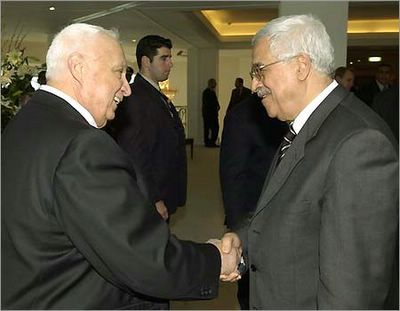Well it last? Let us hope so!

Linda Chavez: If a picture is worth a thousand words, the image of Palestinian leader Mahmoud Abbas reaching across the table to clasp hands with Israeli Prime Minister Ariel Sharon speaks volumes. Abbas looked almost professorial, with his horn-rimmed glasses and conservative business suit and tie, in stark contrast to his predecessor, Yasser Arafat. Gone were Arafat's trademark stubble, desert fatigues and keffiyeh, the checkered Arab headscarf that became all the rage among campus leftists a few years ago. And the sartorial symbolism is more than superficial.
[...]
Anyone who watched the televised summit, hosted by Egyptian President Hosni Mubarak and King Abdullah II of Jordan, immediately grasped the difference between this and previous meetings of the two parties when Arafat was at the helm. In October 2000, Arafat met at Sharm el Sheik with then Israeli Prime Minister Ehud Barak. But President Bill Clinton ran the show during that round of talks, with U.N. Secretary-General Kofi Annan present to give his imprimatur to the meeting. Nothing positive happened at the 2000 confab, despite Clinton's involvement. As The New York Times reported at the time, when the talks ended "all [Clinton] could do was read an agreement that neither Ehud Barak, the Israeli prime minister, nor Yasser Arafat, the Palestinian leader, was willing to sign, to read aloud or to answer questions about."
But this week's summit seemed different. Of course the players had changed on both sides of the table. Not only was Arafat gone, but the hard-liner Sharon had replaced the moderate Barak -- yet it is Sharon who has pledged unilaterally to withdraw settlements from Gaza and parts of the West Bank. And the United States, wisely, decided to stay away and let the parties talk directly.
Still, it is too early to declare Sharm el Sheik II an unqualified success. The symbols were right -- down to the flying of the Israeli flag, something missing at the 2000 Sharm el Sheik meetings. However, symbols only go so far. Abbas has the more difficult task and the most to prove. Sharon has announced that Israel will pull back its troops from Bethlehem, Jericho and Ramallah, and lift roadblocks that make it difficult for Palestinians to travel to jobs. The Israeli public will back Sharon, so long as a new wave of violence does not ensue.

No comments:
Post a Comment